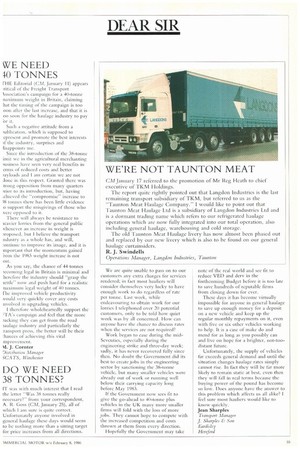WE NEED 10 TONNES
Page 55

If you've noticed an error in this article please click here to report it so we can fix it.
CHE Editorial (CM, _January 11) appears ritical of the Freight Transport kssociation's campaign for a 40-tonne naximum weight in Britain, claiming hat the timing of the campaign is too oon after the last increase, and that it is oo soon for the haulage industry to pay Or it.
Such a negative attitude from a mblication, which is supposed to -epresem and promote the best interests if the industry, surprises and
lisappoints
Since the introduction of the 38-tonne itnit we in the agricultural merchanting nosiness have seen very real benefits in cross of reduced costs and better tayloads and I ant certain we are not ,lone in this respect. Granted there was trong opposition front many quarters trimto its introduction, but, having ,thieved the "compromise" increase to 18 tonnes there has been little evidence o support the misgivings of those who were opposed to it.
There will always be resistance to wavier lorries from the general public whenever an increase in weight is troposed, hut I believe the transport ndustry as a whole has, and will, :ontinuc to improve its image, and it is important that the momentum gained rom the 1983 weight increase is not ost.
As you say, the chance 01 44 tonnes tecoming legal in Britain is minimal and herefore the industry should "grasp the settle" now and push hard for a realistic naximum legal weight of 40 tonnes. [he improved vehicle productivity would very quickly cover any costs nvolved in upgrading vehicles.
I therefore wholeheartedly support the FTA's campaign and feel that the more tacking they can get from the road mulage industry and particularly the :tampon press, the better will be their lances of achieving this vital mprovement.
It J. Cornter
Distribrnion Manager 3CA TS, Winchester




























































